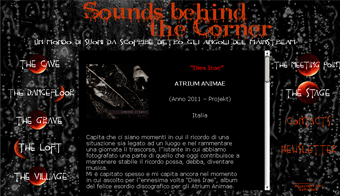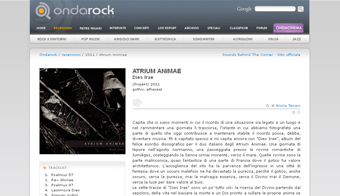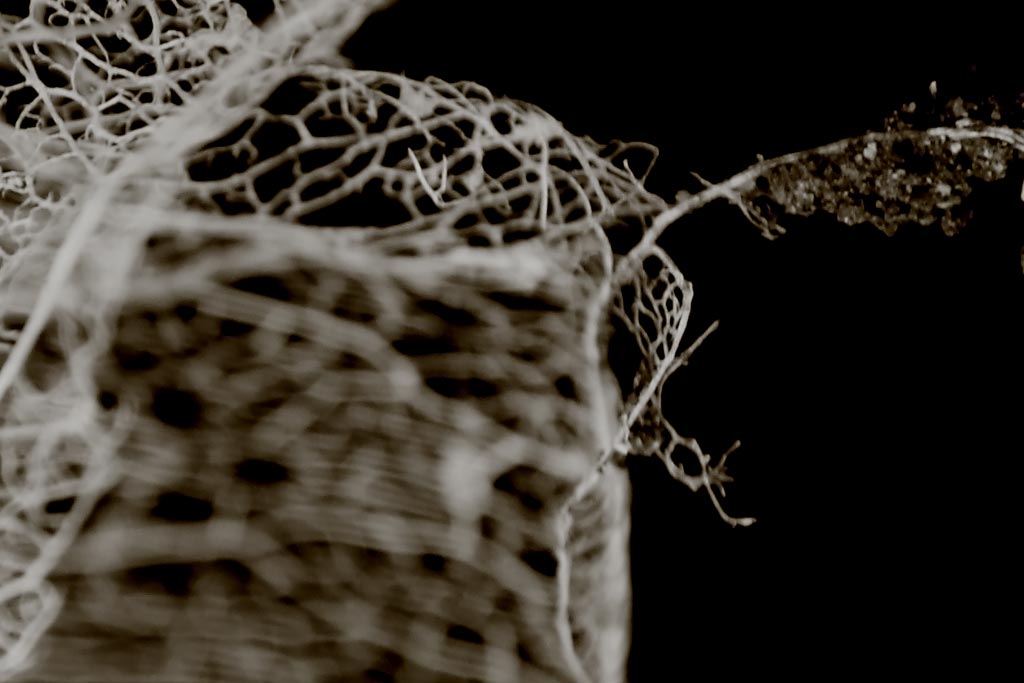Reviews
home > Reviews > soundsbehind_review
REVIEW: ATRIUM ANIMAE - DIES IRAE
ONDA ROCK [JUNE 2011]
SOUNDS BEHIND THE CORNER REVIEW [MAY 2011]
2011 | MAY-JUNE
RATING: 7.5/10

| View on Sounds Behind The Corner
Atrium Animae: 'Dies Irae' - CD Review
by Nicola Tenani
ITALIANO
Capita che ci siano momenti in cui il ricordo di una situazione sia legato ad un luogo e nel rammentare una giornata lì trascorsa, l'istante in cui abbiamo fotografato una parte di quello che oggi contribuisce a mantenere stabile il ricordo possa, debba, diventare musica.
Mi è capitato spesso e mi capita ancora nel momento in cui ascolto per l'ennesima volta “Dies Irae”, album del felice esordio discografico per gli Atrium Animae.
Una giornata di tepore nell'agosto normanno in cui visitai le rovine romantiche di Jumièges, sul lato destro di una strada che dall’‘entroterra, baciando varie abbazie anche romaniche, arriva lentamente, costeggiando la Senna oramai “morente”, verso il mare. Zona geografica felice per cui pittori nei secoli hanno voluto, dovuto, fermare su tela le immagini di quest’‘angolo incantevole di Francia e quelle rovine sono la parte malinconica, quasi fantastica di una parte di Francia dove il gotico ha valore architettonico. Rovine che ancora, nonostante i crolli, le decadenze, portano gli archi, ciò che rimane delle volte, verso Dio; le colonne in parte crollate sono baciate dall'edera. L'accoglienza del sito ha la parvenza dell’‘ingresso in una città di fantasia dove un oscuro maleficio ne ha devastato la purezza, perché il gotico, anche oscuro, cerca la purezza mai la malvagia essenza, cerca il Divino mai il Demone, cerca la luce per dare valore al buio.
Le sette tracce di “Dies Irae” sono un po' tutto ciò: la ricerca del Divino partendo dal sepolcro, della vita nel baciare la morte ed un Dio è pronto a cullare le proprie anime se l'amore per la sua energia, la devozione è felice nell'omaggio con la forma di architettura più difficile mai inventata, la musica.
L'apparenza inganna e se il primo approccio con la musica degli Atrium Animae ispira alle dedizioni arcaico-religiose dei primi Dead Can Dance (Massimiliano oltre ad essere un ottimo compositore in questo album, cura anche il sito italiano della band fondata da Brendan Perry), quando il suono era impregnato di timore e cupo assetto sonoro.
E' un background importante ma in generale “Dies Irae” ha altri piccoli aspetti differenti, nordici nell’‘evocare il darkfolk classicheggiante dei Dargaard o la purezza mistica e pagana dei Garmarna, soprattutto quando il tamburo, sordo, scandisce tempi d'apocalisse annunciata, fatale, come in “Psalmus 57”, sfumata in piccole variabili ritmiche che chiedono ed ottengono in “Rex Gloriae” fiati aperti, luci nuove per non morire subito nell’‘Oltretomba sonoro.
Bellissimo il duetto vocale in questo brano che ora davvero ha la forza evocativa dei Dead Can Dance di “Spleen An Ideal” o dei primi lavori degli Arcana. La voce maschile è quasi monastica, l'orchestrazione ha i sapori dell'Ars antiqua del primo medioevo ancora religiosamente schiavo del dogma punitivo qui esaltato dalle tastiere cupe, minacce reali di un'anima morente, da curare.
Eterea Alessia in “Psalmus 87” tra archi pizzicati ed estasi in ammirazione, un brano che è una porta verso mondi ultraterreni, volendo fantastici, ed in ciò, in questa veste leggermente fairy, c’‘è una sorta di complice affinità con Lugburz, uno dei tanti volti dell’‘immenso Sathorys Elenorth. Soprattutto nella successiva “Lacrimosa Dies” con il suo ritmo più sostenuto.
La musica è il tramite per un pellegrinaggio: usiamo spesso il concetto di viaggio ma qui è pellegrinaggio perché verso fonti ignote e la meta è la settima conclusiva traccia “Angelum Abyssi”, lenta nel condurci fuori dal tempio, forse dalla grotta, sicuramente l’‘unica certezza concessa è la possibilità di riascoltare ancora ed ancora “Dies Irae” per carpirne ogni piccola nota, ogni piccolo aspetto di complessa opera composta da due ragazzi che, come quando la Divinità omaggiata è appagata, si trovano alla corte di una label importante, stabile, generosa come Projekt.
Ex nihilo crevit… Venne su dal nulla…
e la creatura di Alessia e Massimiliano venne su dal nulla sul serio ma oggi può arrivare lontano, il nostro vaticinio è nebbioso a riguardo ma ha una certezza: “Dies Irae” è un bel disco cui ci inchiniamo… senza timore!
[BACK]
ENGLISH
It happens that there are times when the memory of a situation is bound to a place, and in the recall of a day spent there, that moment where we photographed a part of what today helps maintain stable memory will, should, become music.
It happens every time I listen “Dies Irae", the successful debut album release by Atrium Animae.
A warm day in August when I visited the romantic ruins of Jumièges in Norman, kissing various Romanesque abbeys, comes slowly along the Seine now dying to the sea . An geographical area apprechiated by the painters over the centuries, with the ruins are part melancholy, almost a great part of France where the Gothic has architectural value. Ruins that still, despite the crashes, disqualifications, bring the arcs, what remains of the time, to God, the columns partially collapsed. That site has the appearance of an entrance in a city of fantasy where a dark curse has devastated the purity, as the Gothic, also dark, looks for the pure essence, never the evil essence, seeks the Divine not the Demon, looks for the light to give a significance to dark.
The seven tracks of "Dies Irae" are a little bit of that: a reseach of the divine part from the sepulchre,the tomb, the kiss of life in death, a God ready to rock their souls if the love for his energy, the devotion is the gift with the most difficult form of architecture ever invented, music.
And if the first approach to music seems inspired by the archaic and religious of the early Dead Can Dance (Massimiliano as well as a great composer on this album, is the owner of www.dead-can-dance.com, the Italian site of the band founded by Brendan Perry), when the sound was steeped in fear and deep sound structure.
It’s an important background, but in general "Dies Irae" has little other different aspects, the Nordic darkfolk of Dargaard, or purity of classical mysticism and pagan of Garmarna, especially when the drum, deaf, marks time of the announced fatal apocalypse, as in "Psalmus 57", fuzzy variables in small rhythmic calling and get in "Rex Gloriae" open horn and lights, to not die immediately.
Amazingly beautiful the duet vocal on this track, which now really has the evocative power of Dead Can Dance "Spleen An Ideal" or the early work of the Arcana. The male voice is almost monastic, the orchestration of Ars Antiqua of the early Middle Ages has still the sounds of slave to religious dogma punitive here, enhanced by the dark keyboards, real threats of a dying soul, to cure.
Alessia is ethereal in "Psalmus 87", surrounded by pizzicato strings in awe and ecstasy, a song such a door to worlds beyond this world, if you want fantastic, and in this, as in this little fairy, a sort of affinity with Lugburz, one of the many faces of the great Sathorys Elenorth. Especially in the following "Lacrimosa Dies" with its faster pace.
The music is the vehicle for a pilgrimage: we often use the concept of pilgrimage, but here is pilgrimage because to unknown destinations, and the final destination is the seventh track "Angelum abyssi" slow to lead us out of the temple, perhaps from the cave, surely the only certainty is to listen "Dies Irae" again and again, to snatch every little note, every little aspect of a complex work consisting of two people, as when the divinity is honored and satisfied, came to the court of a label, important, stable, generous such as Projekt.
Ex nihilo crevit ... He came up out of nowhere ...
and the creature of Alessia and Massimiliano came up from nothing seriously, but now can go far, our prediction is hazy about it but a certainty: "Dies Irae" is a good album which we bow down without fear...
[BACK]


